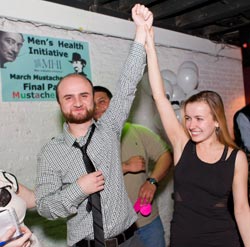Moustache madness aims to trim men's health risks
Assistant Professor of Public Health Michael Rovito likes to say that being a man is harmful to one’s health.
It’s what he tells his students and the community groups that he lectures, and while his opening statement does elicit some chuckles, it is rooted in an alarming truth.
A 2007 study conducted by the American Academy of Family Physicians found that about 30 percent of men surveyed waited “as long as possible” to get medical care, preferring to wait and see if they got better. Meanwhile, prostate and colorectal cancer, while treatable, remain the second and third most common cause of cancer death among men.
“For many men, discussing issues of sickness, vulnerability and death with others is perceived as a breach of their masculinity,” said Rovito. “And this reluctance to talk about such important issues is having a direct effect on our health and wellbeing — on average, men are living five years less than women.”
In fact, it was a health scare with cancer that made Rovito sit up and finally take note of his own health.
"As young men, we're taught to not talk about things like that," he said. "So it was very hard for me to find any kind of information or to find someone that I could talk to about what I was dealing with."
To help overcome these obstacles, Rovito started the Men’s Health Initiative (MHI) in June of 2010, aiming to reduce the health disparity between men and women and promote awareness and action among men in Philadelphia. MHI is the first program of its kind in the region to focus solely on men’s health issues.
“MHI uses three approaches to promote health behaviors: informing men about health and wellness, identifying their unique risks, and implementing behavioral interventions,” said Rovito, whose current research focuses on informed decision making regarding cancer screenings, and preventing testicular cancer among college-age men.
Through MHI, Rovito and his team of student volunteers and interns host workshops and discussions throughout the community on issues critical to men’s health, including cancer screenings, sexuality, fatherhood and societal expectations placed on men.
“Visiting a doctor, talking about sensitive issues — these things can be very intimidating,” said Rovito. “We’ve found that the community outreach has been helpful; the men feel more comfortable in a setting with other men like them.”
MHI’s most recent event was March Mustache Madness, a month-long event that recruited men from across Temple’s campus to grow out their facial hair in order to promote awareness of MHI and of men’s health issues.
“The idea behind it is to start a kind of word-of-mouth campaign around campus,” said Danielle Caton, a student volunteer with MHI. “So you might see a man on campus with his beard grown out and ask him why, and he’ll tell you all about MHI and its focus on men’s health.”
March Mustache Madness ended with a mustache judging contest on March 31 at the Time Lounge at Sansom and 13th streets, to help raise funds for MHI's community outreach and research efforts.
"I never really paid attention to my own health issues before, but this has made it into something I think about every day," said participant Alvaro Watson, a social work graduate student at the College of Health Professions and Social Work. "This is more than just a party — it's become a movement."
